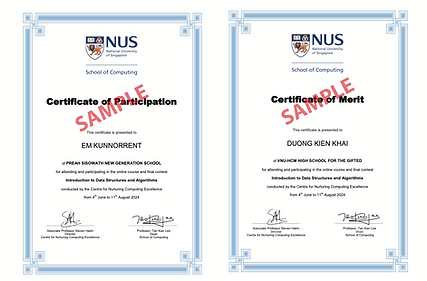

CS1 Course
Programming Methodology with C
-
Requires a pass in CS0.
-
Students who have prior computing courses can apply for exemptions to join CS1 course.
-
Course resources and announcements are delivered through Coursemology
-
Video with 8 Lesson Units
-
Suits for Grades 7-12 (NZ Years 8-13)
Course includes free video training by NUS professors
Registration Deadline
-
Registration Deadline: 1 July 2025
CS1 in-person Online Final Contest
-
Final Contest Date: 2 August 2025
-
Final Contest time:
5 pm - 8 pm (NZ time)
1 pm - 4 pm (NZ-4: Singapore/ Beijing/ Perth time)
3 pm - 6 pm (NZ-2: Sydney time)
-
Students who join NOI 2025 will be quickly given CS1 workshop materials.
-
Obtaining a Pass will allow students to enrol in CS2.
Lesson Plan
-
Lessons are based on video lectures
-
Students can view recordings on their own time, even if on holiday
For NOI Singapore, each contestant works on a PC and is given a choice of programming language to use.
The fee for enrolling CS1 course: NZ $749
BANK: ANZ
Name of Account: Pinnacle Education Group
Account: 06-0241-0684634-00
Please make payment with the students 'full name + CS1 ' as reference.
⚠️ Please note that any fees and payments made are non-refundable.
⚠️ Before you make any payment, read through the refund policy on our website to avoid misunderstandings.
(Terms and conditions apply).
Please note: If you registered after the deadline (1 July), the fees will be doubled.
PGA reserves the right to interpret all competition and course arrangements.

CS1 Final Contest Awards
-
For reference only. CS medals are being designed now.
-
CS medals will be from NUS CeNCE (National University of Singapore Centre For Nurturing Computing Excellence).



Computational Thinking
• Similar to Mathematical Thinking
• Quantification via numbers / structures / representations
• Applied towards Modelling and Computation
• Generally categorised by the following skills:
• Abstraction: generalising data into representations and structures
• Algorithmic Thinking: defining process knowledge specifically (primary focus)
• Decomposition: dividing a problem into sub-problems
• Pattern Recognition: generalising relationships (modelling)
Problem Solving
• General process for finding solutions
• Pólya's Problem-Solving Process (4 steps)
1. Understand the problem: define all the relevant information
2. Devise a plan: attempt using methods that you know
3. Carry out the plan: execute the devised plan and try again if it fails
4. Look back: reflect on what worked and what did not
• Default plan: Brute-force Search (i.e. Automated Guess and Check)
